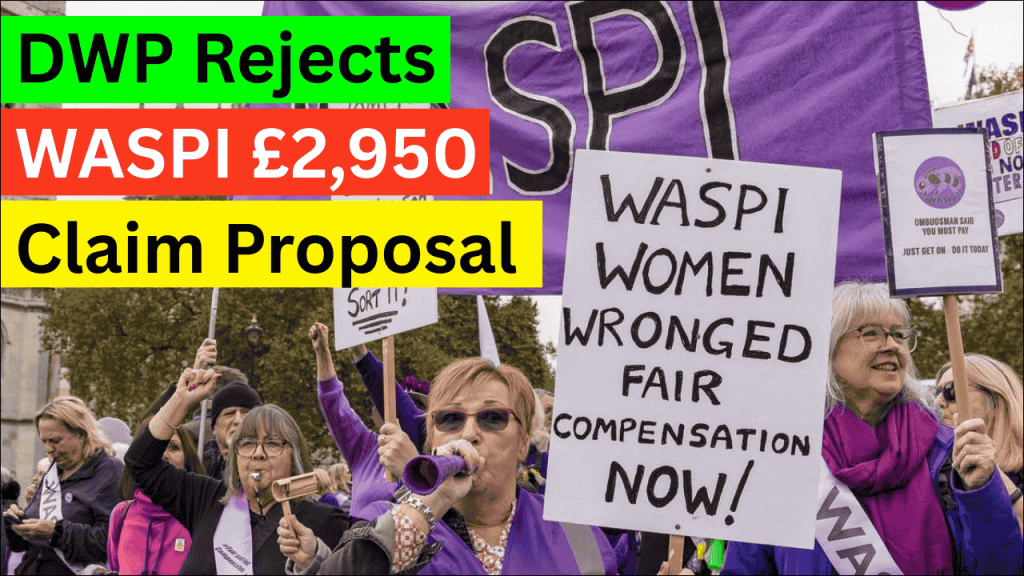
The Department for Work and Pensions (DWP) has formally rejected proposals for a £2,950 compensation payment to Women Against State Pension Inequality (WASPI) campaigners, instead suggesting affected women explore employment opportunities through local jobcentres.
DWP Decision Sparks Outrage
In a move that has ignited fierce criticism from campaigners and opposition MPs, the DWP announced yesterday that it would not implement the Parliamentary and Health Service Ombudsman’s (PHSO) recommendation for compensation to women affected by historical changes to the state pension age.
The WASPI campaign, which represents nearly 3.8 million women born in the 1950s who had their state pension age increased with what they claim was inadequate notice, expressed outrage at the decision.
“After years of fighting for justice, we are devastated that the government has dismissed our legitimate claims so callously,” said Jane Harrison, WASPI campaign director. “Suggesting women in their late 60s and 70s should visit jobcentres for employment advice shows a fundamental misunderstanding of the hardship many have endured.”
Background to the Controversy
The controversy stems from legislation passed in 1995 and 2011 that increased the state pension age for women from 60 to 65, and later to 66, to achieve parity with men. While the principle of equalizing pension ages was broadly accepted, the WASPI campaign has consistently argued that affected women received inadequate notice of these changes, leaving many without time to make alternative financial arrangements for retirement.
In March 2024, the PHSO concluded its investigation, finding “maladministration” by the DWP in its communication of the changes. The Ombudsman recommended compensation payments at “Level 6” of its scale—equivalent to approximately £2,950 per affected woman.
Financial Implications
The total cost of implementing the recommended compensation would be significant:
| Description | Figure |
|---|---|
| Estimated number of affected women | 3.8 million |
| Recommended compensation per person | £2,950 |
| Total potential compensation cost | £11.21 billion |
| Average annual DWP budget (2024-25) | £240 billion |
| Compensation as percentage of annual DWP budget | 4.67% |
A DWP spokesperson stated: “After careful consideration of the fiscal implications, we have determined that such payments would place undue pressure on public finances at a time when economic stability must be our priority.”
Government Alternative Proposal
Rather than direct compensation, the DWP has outlined alternative support measures:
- Enhanced access to employment support services at local jobcentres
- Financial guidance through the government’s MoneyHelper service
- Additional welfare benefits guidance for those experiencing financial hardship
The department has established a dedicated helpline for affected women to discuss available support options, accessible via the DWP Contact Page.
Legal Challenges and Parliamentary Response
Legal experts suggest the government’s decision may face judicial review. Caroline Matthews, a pensions law specialist at Hammond Legal Associates, commented: “The rejection of the Ombudsman’s findings raises serious questions about the effectiveness of our public accountability systems.”
In Parliament, the announcement triggered heated exchanges. Opposition MPs have pledged to table an urgent question and force a debate on the issue. The All-Party Parliamentary Group on State Pension Inequality for Women has called for an emergency meeting.
Information on the original pension changes can be found on the State Pension Age website, while details about the Ombudsman’s investigation are available on the PHSO website.
Impact on Affected Women
Research conducted by Age UK indicates that the pension age changes have had profound effects on many women’s lives:
| Impact | Percentage of Affected Women |
|---|---|
| Forced to continue working past expected retirement | 71% |
| Experienced financial hardship | 63% |
| Unable to help care for grandchildren/elderly relatives as planned | 52% |
| Reported negative mental health impacts | 47% |
| Forced to sell or downsize their home | 29% |
“These statistics represent real hardship,” said Eleanor Phillips from Age UK. “For many women, the suggestion they should now seek employment through jobcentres is both impractical and insensitive given their age, health status, and caring responsibilities.”
International Comparisons
The UK’s handling of state pension age changes contrasts with approaches taken in other countries:
Several European nations implemented longer transition periods when equalizing pension ages, with some providing partial compensation for those most affected. In Australia, similar pension age increases were announced with a minimum ten-year notice period, compared to what some WASPI women claim was as little as one year’s notice in the UK.
Future Campaign Plans
WASPI leaders have vowed to continue their fight following this setback. Campaign coordinators announced plans for:
- A mass demonstration outside Parliament in June
- Legal action exploring judicial review options
- A renewed media campaign highlighting personal stories
- Engagement with international human rights bodies
“This is far from over,” stated WASPI regional coordinator Michelle Taylor. “Many of our members have already lost out on up to £50,000 in pension payments. The suggested ‘solution’ of jobcentre referrals for women in their late 60s and 70s is nothing short of insulting.”
Women seeking information about their specific situation can check their state pension forecast via the Check your State Pension forecast service.
Government Position
A Treasury spokesperson defended the decision: “While we recognize the disappointment this will cause, fiscal responsibility must guide our decisions. The government has committed to supporting vulnerable pensioners through other targeted measures, including Pension Credit, details of which can be found at gov.uk/pension-credit.”
The Work and Pensions Secretary added: “Our jobcentres offer specialized support for older workers wishing to return to employment, with dedicated Work Coaches familiar with the unique challenges faced by this demographic.”
Expert Opinion
Pensions policy experts remain divided on the issue. Professor Martha Henderson of the Institute for Fiscal Studies noted: “While the fiscal challenge of full compensation is real, the government’s alternative proposal fails to address the core issue of notice that the Ombudsman identified.”
Frequently Asked Questions
Who exactly is affected by the state pension age changes?
Women born between April 6, 1950, and April 5, 1960, were affected by the 1995 and 2011 Pension Acts that increased the state pension age from 60 to 65, and later to 66. This impacted approximately 3.8 million women, with those born in the mid-1950s experiencing the most significant changes with the shortest notice periods.
What was the Parliamentary Ombudsman’s finding?
The Parliamentary and Health Service Ombudsman (PHSO) concluded that the DWP failed to provide adequate and timely information about the changes to women’s state pension age. They found this constituted “maladministration” and recommended compensation at Level 6 of their scale, approximately £2,950 per affected woman.
Can I still claim my state pension if I was affected by these changes?
Yes, affected women can claim their state pension upon reaching their new state pension age. To check your state pension age and forecast, visit the government’s Check your State Pension age tool and State Pension forecast service.

Isabell Johnson is a passionate writer known for captivating stories that blend imagination and reality. Inspired by travel, history, and everyday moments, She crafts narratives that resonate deeply with readers.




